Latin Language and Culture Collection (18 vols.)
Digital Logos Edition
This product has been transferred from Community Pricing to Pre-Pub. The actual funding level may be lower than it appears, which could delay production. The amount of funding still needed will be evaluated and updated soon.
Overview
The Latin Language and Culture Collection bundles three works that represent some of the earliest ventures into linguistics, a freeze-frame of Latin in the making, and the intersection of Roman culture and the Latin language. Together, these works reconstruct a piece of the past and provide an opportunity to study socio-linguistics in ancient Rome. The surviving books of Varro’s On the Latin Language contemporaneously explore the lexical development of the Latin language in the second and first centuries BC, examining how Latin words originated and evolved. Remains of Old Latin compiles the work of ancient Roman poets, as well as legal and public documents of ancient Rome, giving us a picture of the beginnings of the written language that Virgil would deftly wield. Finally, Attic Nights, by the author and grammarian Aulus Gellius, represents a lifetime of ponderings on language, science, philosophy, and history—an invaluable look into the thought and values of Ancient Roman intellectuals.
This collection contains the complete texts in their Loeb Classical Library editions. Each text is included in its original Latin, with an English translation for side-by-side comparison. These fully indexed texts enable comparison and cross-reference with other Roman history and literature collections. Use Logos’ language tools to go deeper into the Latin language with linked translations, definitions, and pronunciation tools. You can also use the dictionary lookup tool to examine difficult English words. Quick and easy access to maps and charts, as well as definitions and lexical information, allows you to see the historical context of these works like never before. There’s never been a better way for students of history, language, or culture to study ancient Latin.
Key Features
- Contemporaneous explorations of old Latin
- Collection of old Latin poetry and prose
- Window into Ancient Rome’s societal values and academic pursuits
- Loeb Classical Library editions
Product Details
- Title: Latin Language and Culture Collection
- Authors: Varro, Ennius, Caecilius, Livius Andronicus, Naevius, Pacuvius, Accius, and Aulus Gellius
- Translators: Rland G. Kent, E. H. Warmington, and J. C. Rolfe
- Series: Loeb Classical Library
- Publisher: Harvard University Press
- Volumes: 18
- Pages: 4,932
Individual Titles
- On the Latin Language, vol. 1
- On the Latin Language, vol. 1: Latin Text
- On the Latin Language, vol. 2
- On the Latin Language, vol. 2: Latin Text
- Remains of Old Latin, vol. 1
- Remains of Old Latin, vol. 1: Latin Text
- Remains of Old Latin, vol. 2
- Remains of Old Latin, vol. 2: Latin Text
- Remains of Old Latin, vol. 3
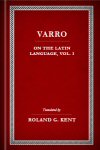
This volume contains an introduction and Roland G. Kent’s translation of books 5 through 7 of On the Latin Language.
Varro was an ancient Roman scholar and writer. He was appointed to oversee Rome’s Library by Caesar, but fell out of favor with Marc Antony. He regained the this favor under Augustus, who’s protection enabled him to devote himself to study and writing.
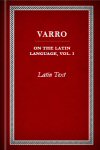
This volume contains the Latin text of books 5 through 7 of On the Latin Language.
Varro was an ancient Roman scholar and writer. He was appointed to oversee Rome’s Library by Caesar, but fell out of favor with Marc Antony. He regained the this favor under Augustus, who’s protection enabled him to devote himself to study and writing.
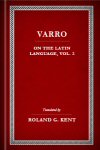
On the Latin Language, vol. 2
- Author: Varro
- Translator: Roland G. Kent
- Series: Loeb Classical Library
- Publisher: Harvard University Press
- Publication Date: 1938
- Pages: 166
This volume contains Roland G. Kent’s translation of books 8 through 10.
Varro was an ancient Roman scholar and writer. He was appointed to oversee Rome’s Library by Caesar, but fell out of favor with Marc Antony. He regained the this favor under Augustus, who’s protection enabled him to devote himself to study and writing.
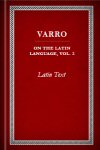
On the Latin Language, vol. 2: Latin Text
- Author: Varro
- Series: Loeb Classical Library
- Publisher: Harvard University Press
- Publication Date: 1938
- Pages: 166
This volume contains the Latin text of books 8 through 10.
Varro was an ancient Roman scholar and writer. He was appointed to oversee Rome’s Library by Caesar, but fell out of favor with Marc Antony. He regained the this favor under Augustus, who’s protection enabled him to devote himself to study and writing.
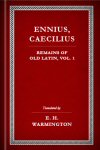
This volume contains E. H. Warmington’s translation of remnants of old Latin from Ennius and Caecilius.
Ennius (239–169 BC) is considered the father of Roman poetry. His work brought Greek literary models to the Latin language.
Caecilius was a comic poet in the second and first centuries BC. He was brought to Rome as a slave and later freed. He was a close friend of his contemporary, Ennius.
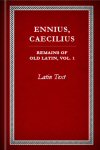
This volume contains the Latin text of remnants of old Latin from Ennius and Caecilius.
Ennius (239–169 BC) is considered the father of Roman poetry. His work brought Greek literary models to the Latin language.
Caecilius was a comic poet in the second and first centuries BC. He was brought to Rome as a slave and later freed. He was a close friend of his contemporary, Ennius.
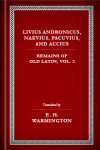
Remains of Old Latin, vol. 2
- Authors: Livius; Andronicus; Naevius; Pacuvius; Accius
- Translator: E. H. Warmington
- Series: Loeb Classical Library
- Publisher: Harvard University Press
- Publication Date: 1936
- Pages: 360
This volume contains E. H. Warmington’s translation of remnants of old Latin from Livius Andronicus, Naevius, Pacuvius, and Accius.
Livius Andronicus was a Greco-Roman dramatist and poet in the second century BC. He is regarded as the father of Roman drama, and Livy credits Livius as the first to write a play with a plot.
Naevius was a Roman dramatist in the second century BC. He was a solider in the first Punic War, which inspired an epic poem. It was the first nationally Roman epic poem.
Pacuvius (220–130 BC) was a tragic dramatist and painter. He began writing late in his life and wrote into his 80s. He is regarded as the greatest of ancient Rome’s tragic poets.
Accius (170–86 BC) was a Roman tragic poet and literary scholar. He often dramatized historical events and advocated several reforms in Latin spelling.
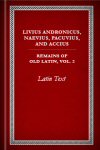
Remains of Old Latin, vol. 2: Latin Text
- Authors: Livius; Andronicus; Naevius; Pacuvius; Accius
- Series: Loeb Classical Library
- Publisher: Harvard University Press
- Publication Date: 1936
- Pages: 360
This volume contains the Latin texts of remnants of old Latin from Livius, Andronicus, Naevius, Pacuvius, and Accius.
Livius Andronicus was a Greco-Roman dramatist and poet in the second century BC. He is regarded as the father of Roman drama, and Livy credits Livius as the first to write a play with a plot.
Naevius was a Roman dramatist in the second century BC. He was a solider in the first Punic War, which inspired an epic poem. It was the first nationally Roman epic poem.
Pacuvius (220–130 BC) was a tragic dramatist and painter. He began writing late in his life and wrote into his 80s. He is regarded as the greatest of ancient Rome’s tragic poets.
Accius (170–86 BC) was a Roman tragic poet and literary scholar. He often dramatized historical events and advocated several reforms in Latin spelling.
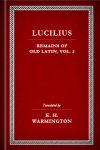
Remains of Old Latin, vol. 3
- Author: Lucilius
- Translator: E. H. Warmington
- Series: Loeb Classical Library
- Publisher: Harvard University Press
- Publication Date: 1938
- Pages: 303
This volume contains E. H. Warmington’s translation of remnants of old Latin from Lucilius and The Twelve Tables.
Lucilius was the first of the Roman satirists. Unlike other Roman literature, Lucilius’ satire is distinctly Roman, owing little to the Greeks. Lucilius’ genre developed and became popular in Rome.
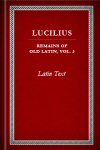
Remains of Old Latin, vol. 3: Latin Text
- Author: Lucilius
- Series: Loeb Classical Library
- Publisher: Harvard University Press
- Publication Date: 1938
- Pages: 303
This volume contains the Latin texts of remnants of old Latin from Lucilius and The Twelve Tables.
Lucilius was the first of the Roman satirists. Unlike other Roman literature, Lucilius’ satire is distinctly Roman, owing little to the Greeks. Lucilius’ genre developed and became popular in Rome.
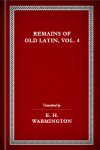
Remains of Old Latin, vol. 4
- Translator: E. H. Warmington
- Series: Loeb Classical Library
- Publisher: Harvard University Press
- Publication Date: 1940
- Pages: 272
This volume contains an introduction and E. H. Warmington’s translation of remnants of old Latin from archaic inscriptions.
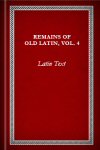
Remains of Old Latin, vol. 4: Latin Text
- Series: Loeb Classical Library
- Publisher: Harvard University Press
- Publication Date: 1940
- Pages: 272
This volume contains the Latin texts of remnants of old Latin from archaic inscriptions.
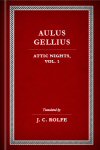
Attic Nights, vol. 1
- Author: Aulus Gellius
- Translator: J. C. Rolfe
- Series: Loeb Classical Library
- Publisher: Harvard University Press
- Publication Date: 1927
- Pages: 264
This volume contains an introduction and J. C. Rolfe’s translation of the first five books of Attic Nights.
Aulus Gellius (125–180 AD) was a Latin author and grammarian who was born and raised in Rome. He was educated in Athens. He is most famous for Attic Nights, a compilation of thoughts on language, philosophy, science, and history that preserves several authors and ideas that would otherwise be unknown today.
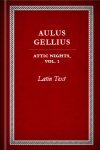
Attic Nights, vol. 1: Latin Text
- Author: Aulus Gellius
- Series: Loeb Classical Library
- Publisher: Harvard University Press
- Publication Date: 1927
- Pages: 264
This volume contains the Latin text of the first five books of Attic Nights.
Aulus Gellius (125–180 AD) was a Latin author and grammarian who was born and raised in Rome. He was educated in Athens. He is most famous for Attic Nights, a compilation of thoughts on language, philosophy, science, and history that preserves several authors and ideas that would otherwise be unknown today.
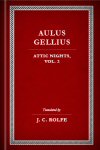
Attic Nights, vol. 2
- Author: Aulus Gellius
- Translator: J. C. Rolfe
- Series: Loeb Classical Library
- Publisher: Harvard University Press
- Publication Date: 1927
- Pages: 288
This volume contains J. C. Rolfe’s translation of books 6 through 13 of Attic Nights.
Aulus Gellius (125–180 AD) was a Latin author and grammarian who was born and raised in Rome. He was educated in Athens. He is most famous for Attic Nights, a compilation of thoughts on language, philosophy, science, and history that preserves several authors and ideas that would otherwise be unknown today.
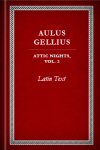
Attic Nights, vol. 2: Latin Text
- Author: Aulus Gellius
- Series: Loeb Classical Library
- Publisher: Harvard University Press
- Publication Date: 1927
- Pages: 288
This volume contains the Latin text of books 6 through 13 of Attic Nights.
Aulus Gellius (125–180 AD) was a Latin author and grammarian who was born and raised in Rome. He was educated in Athens. He is most famous for Attic Nights, a compilation of thoughts on language, philosophy, science, and history that preserves several authors and ideas that would otherwise be unknown today.
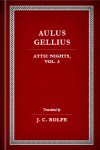
Attic Nights, vol. 3
- Author: Aulus Gellius
- Translator: J. C. Rolfe
- Series: Loeb Classical Library
- Publisher: Harvard University Press
- Publication Date: 1927
- Pages: 268
This volume contains J. C. Rolfe’s translation of books 14 through 20 of Attic Nights.
Aulus Gellius (125–180 AD) was a Latin author and grammarian who was born and raised in Rome. He was educated in Athens. He is most famous for Attic Nights, a compilation of thoughts on language, philosophy, science, and history that preserves several authors and ideas that would otherwise be unknown today.
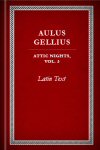
Attic Nights, vol. 3: Latin Text
- Author: Aulus Gellius
- Series: Loeb Classical Library
- Publisher: Harvard University Press
- Publication Date: 1927
- Pages: 268
This volume contains the Latin text of books 14 through 20 of Attic Nights.
Aulus Gellius (125–180 AD) was a Latin author and grammarian who was born and raised in Rome. He was educated in Athens. He is most famous for Attic Nights, a compilation of thoughts on language, philosophy, science, and history that preserves several authors and ideas that would otherwise be unknown today.